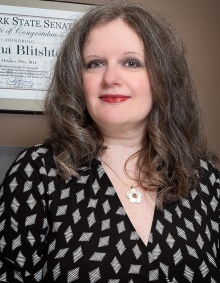Language matters
How to communicate better with patients with complex chronic disorders

By Ellen Goldbaum
Disbelief. Judgment. Gaslighting. Dismissal.
These are among the responses that patients with chronic complex disorders have, unfortunately, received from many health care providers. These reactions do nothing to help patients and can even increase their suffering, according to UB researchers Nancy J. Smyth, professor and associate dean for faculty development in the School of Social Work, and Svetlana Blitshteyn, clinical associate professor of neurology in the Jacobs School of Medicine and Biomedical Sciences.
It’s not that clinicians want to dismiss their patients’ health issues, they say, but standard medical training does not teach enough about complex chronic disorders. In a new paper, published in the International Journal of Environmental Research and Public Health, they provide recommendations to help physicians more effectively communicate with, and treat, these patients.
‘Wastebasket diagnoses’
“Many physicians were trained to accept concrete diagnoses,” Blitshteyn explains, “so disorders and syndromes that fall beyond straightforward organ or system damage and that are complex and multidisciplinary in nature — encompassing several systems, organs and pathophysiologic mechanisms — are going to be misunderstood or put aside in the category of ‘wastebasket diagnoses.’
“We are dealing with actual people who are suffering with these disorders, so we must do better with education, training and thinking outside the conventional clinical care box if we are to help these patients, which is our job as physicians,” she continues.
Much like common chronic disorders today — including long COVID and myalgic encephalomyelitis/chronic fatigue syndrome (ME/CFS) — Blitshteyn says history is filled with disorders that were treated as psychological and psychosomatic until scientific research established a medical reason for heretofore mysterious symptoms.
“Peptic ulcers were believed to be caused by stress before H. pylori was discovered, and multiple sclerosis was considered to be a disorder of hysterical females,” she says. “I always explain that you can’t think or exercise your way out of long COVID, dysautonomia or ME/CFS any more or any less than you can if you have MS or rheumatoid arthritis.”
Unintended harm
The medical community’s inexperience with such disorders has harmful, potentially long-lasting, consequences for patients, says Smyth, the paper’s lead author.
“When one encounters people who are not hearing you, or are ignoring what you’re saying, or are telling you that what you are experiencing in your body is not real, these interactions have negative consequences,” Smyth says. “Patients may end up feeling stressed, anxious, angry and hopeless after these interactions and then mistrust these health care professionals. For that reason, these kinds of interactions can be viewed as iatrogenic; that is, when a treatment causes unintended harm.”
In extreme circumstances, the patient may give up seeking health care altogether.
The researchers stress that working with patients with these disorders is quite challenging. They acknowledge that many clinicians are apprehensive about managing these disorders when they lack proper training and there are no diagnostic biomarkers or FDA-approved therapies.
What not to say
But better communication can significantly improve the clinician’s relationship with these patients so that they ultimately benefit. In their paper, the researchers provide resources to help providers improve their communication skills, including continuing medical education courses, other curricula and a list of “never words” that should never be used in patient interactions (see sidebar).
Longer term, Blitshteyn says all health care professionals should study complex chronic disorders in medical or graduate school — just as the Jacobs School students who shadow her at the Dysautonomia Clinic in Buffalo are doing already.
“My hope is that when they move on in their medical training and start practicing, they will be able to recognize, diagnose and treat these conditions and not dismiss or misdiagnose these patients with psychological problems,” she says

Nancy J. Smyth, professor and associate dean for faculty development

Svetlana Blitshteyn, clinical associate professor of neurology
The UB researchers compiled a list of statements — and suggested alternatives — to help providers recognize language that could harm patients. Here’s a sample. For a complete list of “never words,” check out their paper, available through open access.
| Never words | Alternative |
|---|---|
“You need to stay positive.” | “I know it can feel discouraging to feel so sick, and especially for so long. We will work on this together.” |
“You don’t look sick.” | Refrain from commenting on appearance. |
“Learn to live with this.” | “I know this illness can really disrupt your life. What did you do to adjust to this?” |
“At least it’s not cancer.” | Avoid comparing diseases to make a patient feel better, since it usually has the opposite impact. |
“Good news: Your tests are all normal.” | “The tests we have run so far are not showing any abnormalities, and the good news is that we have excluded certain conditions based on the results of these tests.” |
“You feel sick because you are (hormonal status: perimenopausal, menopausal, postmenopausal, postpartum, pregnant, menstruating, ovulating).” | Refrain from commenting on hormonal status. A referral to a gynecologist or endocrinologist might be appropriate if there are concerns of hormonal abnormalities or a need for hormonal supplementation. |
“You need to (instruction as cures: lose/gain weight, start exercising, get fresh air, get a job, get a hobby, start dating, etc.).” | “When you feel better, we will work together toward a common goal of improved quality of life and a healthier lifestyle.” |